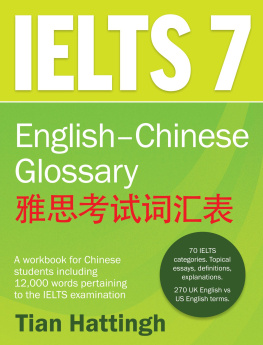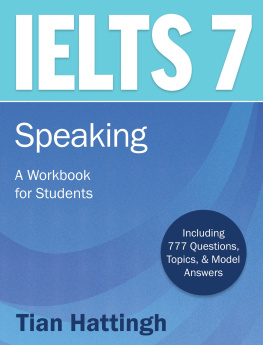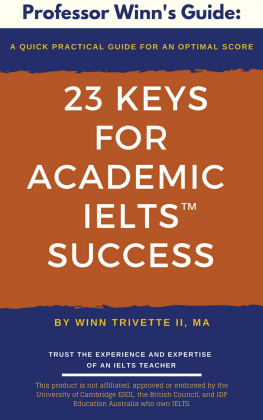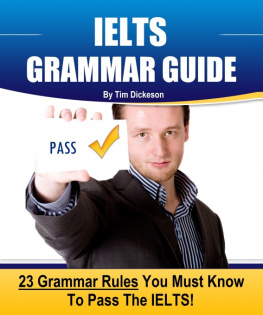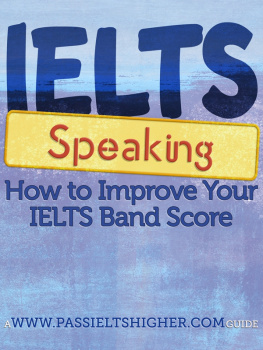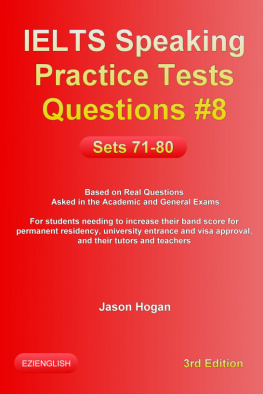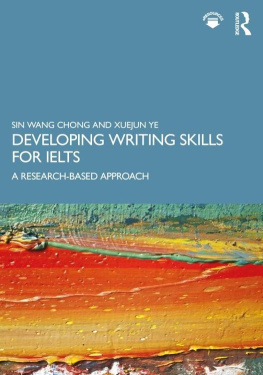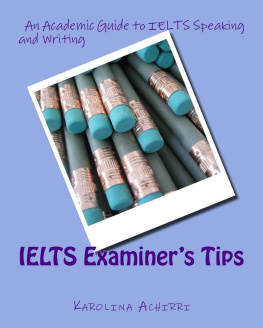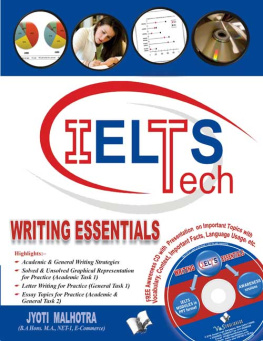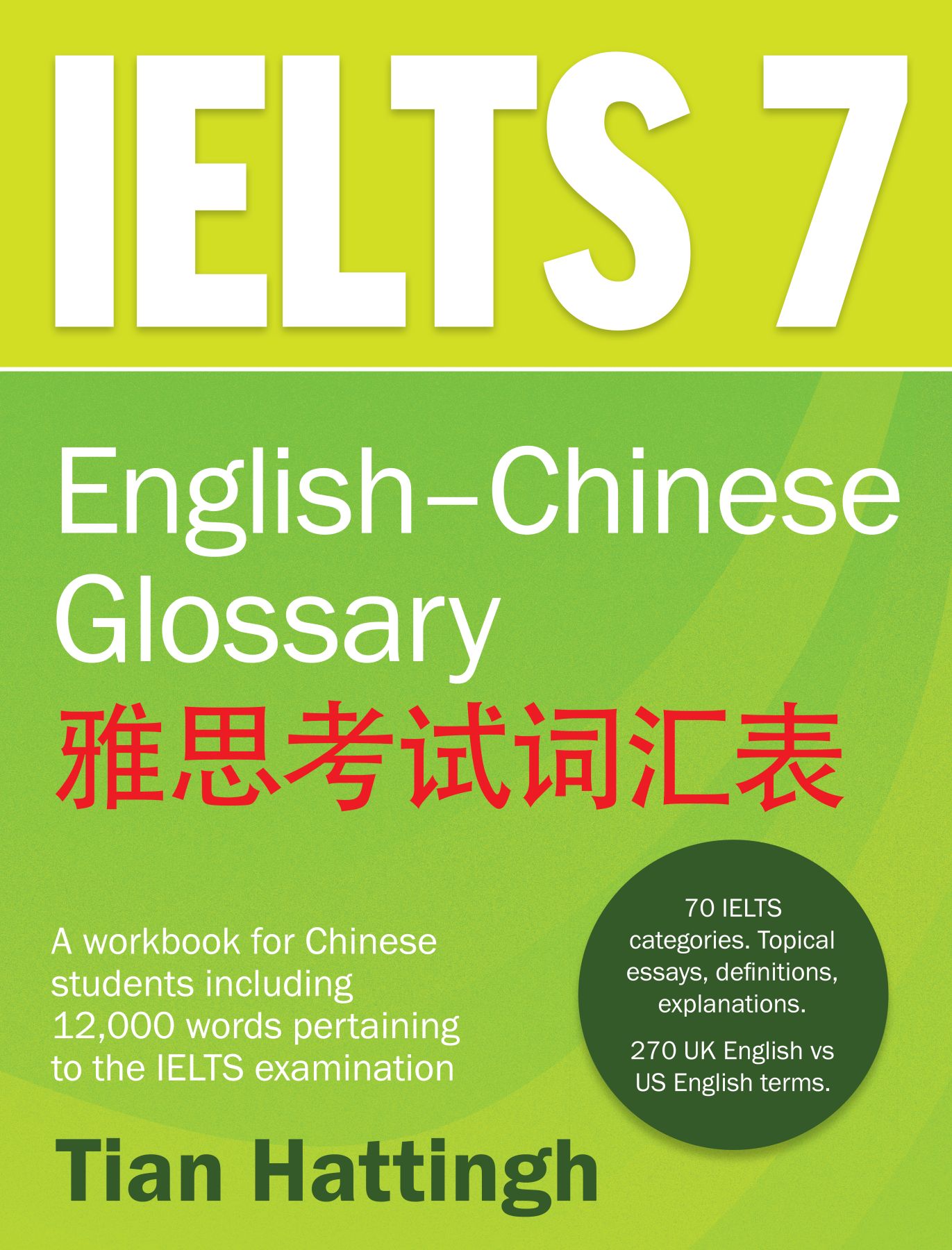
IELTS 7 GLOSSARY
EnglishChinese Glossary
Including 12,000 Words in 70 IELTS Categories
Tian Hattingh

Copyright 2018 Tian Hattingh
The moral right of the author has been asserted.
Apart from any fair dealing for the purposes of research or private study, or criticism or review, as permitted under the Copyright, Designs and Patents Act 1988, this publication may only be reproduced, stored or transmitted, in any form or by any means, with the prior permission in writing of the publishers, or in the case of reprographic reproduction in accordance with the terms of licences issued by the Copyright Licensing Agency. Enquiries concerning reproduction outside those terms should be sent to the publishers.
Matador
9 Priory Business Park,
Wistow Road, Kibworth Beauchamp,
Leicestershire. LE8 0RX
Tel: 0116 279 2299
Email:
Web: www.troubador.co.uk/matador
Twitter: @matadorbooks
This work may contain copyrighted material the use of which has not always been specifically authorized by the copyright owner. Such material is made available for educational purposes, to advance understanding of human rights, democracy, scientific, moral, ethical, and social justice issues, etc. It is believed that this constitutes a fair use of any such copyrighted material as provided for in Title 17 U.S.C. section 107 of the US Copyright Law.
IELTS is a registered trademark of University of Cambridge ESOL, the British Council, and IDP Education Australia. By using this book, in printed and/or electronic formats, readers agree that they fully understand that IELTS-7 is not affiliated, approved or endorsed by University of Cambridge ESOL, the British Council, or IDP Education Australia.
ISBN 978 1789017 267
ISBN (e-book) 978 1789013 023
British Library Cataloguing in Publication Data.
A catalogue record for this book is available from the British Library.
Design, Typeset, and Cover by Scribe Inc., Philadelphia, Pennsylvania, United States

Matador is an imprint of Troubador Publishing Ltd
Dedicated to my best friends Abby, Lilly, Steven, Nancy, Hellen, and Gaskin
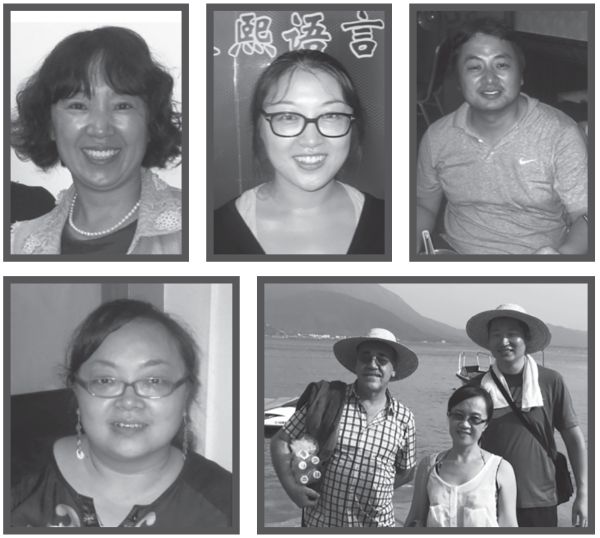
CONTENTS
BAND 9: EXPERT USER
The candidate has a fully operational command of the language. In other words, the language is appropriate, accurate, and fluent and accompanied by complete understanding.
BAND 8: VERY GOOD USER
The candidate has an operational command of the language with only occasional unsystematic inaccuracies. Misunderstandings do occur in unfamiliar situations. The candidate is able to handle complex, detailed argumentation as well.
BAND 7: GOOD USER
The candidate has an operational command of the language, though with occasional inaccuracies, inappropriacies, and misunderstandings in some situations. The candidate generally handles complex language well and understands detailed reasoning.
BAND 6: COMPETENT USER
The candidate has a generally effective command of the language despite some inaccuracies, inappropriacies, and misunderstandings. The candidate is able to use and understand fairly complex language, particularly in familiar situations.
BAND 5: MODEST USER
The candidate has a partial command of the language, coping with overall meaning in most situations, though he or she is likely to make many mistakes. The candidate should be able to handle basic communication in his or her own field.
BAND 4: LIMITED USER
The candidate has a basic competence that is limited to familiar situations. He or she has frequent problems in understanding and expression. The candidate is not able to use complex language.
BAND 3: EXTREMELY LIMITED USER
The candidate is able to convey and understand only general meanings in very familiar situations, but frequent breakdowns in communication will occur.
BAND 2: INTERMITTENT USER
No real communication is possible except for the most basic information using isolated words or short formulae in familiar situations and to meet immediate needs. The candidate has great difficulty understanding spoken and written English.
BAND 1: NONUSER
The candidate essentially has no ability to use the language beyond possibly a few isolated words.
BAND 0
The candidate did not attempt the test, and no assessable information was provided.
1. INTRODUCTION
- 1.1 Often I call the following points secrets because very few people know about them, or if they know, they do not pay sufficient attention to them. As will be seen, most of the points involve nothing more than simple common sense and should be seen as hints to how a candidate can achieve the maximum band score with the skills and knowledge that he or she has procured during his or her preparations.
- 1.2 Some of these points can be found on the official IELTS websites, but some points will not be discussed by any IELTS official and/or examiner, as they are considered to be inside information.
- 1.3 The owners of IELTS are very proud of their excellent standards and reputation. This is the only way to ensure a high level of credibility in the academic world.
- 1.4 There are many myths on the internet about the IELTS exam. These myths usually originated from people who are not native English speakers. Some of these myths are pure nonsense. For example,
- a. The test is easier in some locations. This is not true. The tests and the scoring are exactly the same all over the world.
- b. The examiner who does the Speaking test is the same person who will check my Writing test, so I cannot repeat something in Writing and Speaking. This is possible, but highly unlikely.
- c. The Speaking test is recorded because the examiner who is doing the Speaking test is not the one who will give me my score. This is false. The test is recorded in case you dispute the score that you received. In that case, the recording will be played back to one or more alternative Examiners and then a decision will be made by them together.
- d. Speaking and Writing topics can be predicted. This is false. Lazy students like to believe this. Unlike some other testing systems, there are no shortcuts when doing the IELTS exam.
2. GENERAL
- 2.1 Vocabulary is one of the four criteria in Speaking and Writing.
- a. Keep your own personal vocabulary log. If you do not have one, start one immediately and keep it up to date for the rest of your life.
- b. Use your vocabulary log to set up a review program.
- c. Vocabulary should be functional.
- 2.2 There is no way for you to get a high score if you do not have a functional vocabulary of about ten thousand words. Functional vocabulary means you know all the meanings of the word, the correct spelling, the correct pronunciation, and most importantly, how to use the word in a speech or an essay.
- 2.3 A shallow but wide general knowledge is a key component for a high overall band score. Subjects like history, geography, biology (botany and zoology), chemistry, mathematics, and so on are absolutely crucial in all the IELTS disciplines.
Next page
